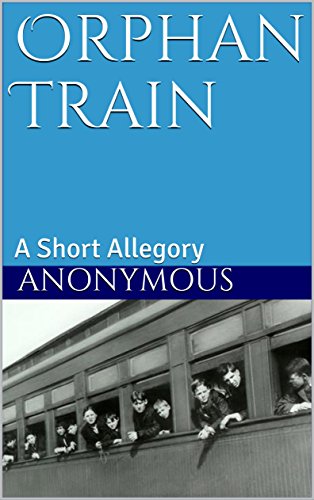
As we journeyed, we met many of the other orphans, and discovered that they were divided sharply into two groups. One smaller set of orphans was fiercely loyal to The Small Group who ran The Master’s Proclaimers. The other set of orphans did not respect the Small Group or the Proclaimers at all.This larger set of orphans engaged in varying activities running the whole range of good and bad behavior, from fighting to getting along splendidly. Mostly they passed the time with card games, songs, stunts, and conversations. The Proclaimers, meanwhile, divided their time between reading the Small Group’s documents together and trying to convince others to join them. Occasionally a non-proclaimer became a Proclaimer, and just as occasionally a Proclaimer gave up being one. But for the most part, the two groups kept separate from each other, the Proclaimers occupying a smaller corner of the train car. Their attempts at conversations with the others were often met with such responses as “Go away,” and “Don’t bother me with your propaganda.”
My friend and I became increasingly frustrated with both groups. The fault of the Proclaimers was that their friendliness lasted only as long as a prospect showed interest in their message. As soon as a prospect began challenging any of the Small Group’s truth claims or authority, the prospect was then actively avoided by the Proclaimers. The fault of the non-Proclaimers was their complacency, showing no interest in reading the Master’s Contract at all. Neither group gave priority to the most important document available to them. My friend and I discovered much value in the document, gaining encouragement, even excitement, from its words. We wanted to share what we were learning with both groups, so we tried several methods. Public speaking with a loud voice from the front of the car was met with cowering and ear-plugging from the Proclaimers, and with either ignoring or hostile boo-ing from the non-Proclaimers. (Each of the two groups thought we represented the other.) We offered classes, lectures, and studies that no one attended. We wrote extensive notes that nobody read.
What finally proved effective was simply our friendship, and the Master’s Contract itself. We sought to make friends (and keep them) from both groups, and when the opportunities arose, shared with them briefly something from the contract, telling them how it had benefitted our lives. We also asked them questions about their experiences, and how The Contract could impact their lives. We showed them, for example, the “adoption” section of The Contract, asking whether they had experienced that reality in their lives, and whether they would like to.
The results varied, from awkward (but usually polite) rejection, to a desire to hear more. But we always got at least a little further than the immediate hostility experienced before.
No matter the response, we found that our friends were responding, not to us, but to The Contract itself. And in most cases, we were able to keep them as friends. We played games with the Non-Proclaimers. We attended some of the studies led by the Proclaimers. And we had friendly conversations with both.
So that’s my story. I’ve been riding this train ever since, delighted to be no longer an orphan, but a son of the Master, always eagerly looking forward to experiencing the glory of the Master’s estate and the beauty of the surrounding countryside. I can hardly wait to get there. But in the meantime, without a doubt, my friend and I (and the other orphans who eventually joined us) are experiencing the most and the deepest pleasure from our journey aboard the orphan train. We love sharing with others the Great Stuff we find in The Contract.
And now I want to ask you, wouldn’t you like to be adopted by The Master too?
[End]
Link to location on Amazon to download the whole story: Here.
